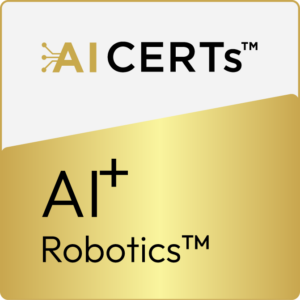- modules: 13
- Examination: 1
- Examination Time: 50 MCQs, 90 Minutes
- Passing Score: 70%
About Certification
The AI+ Robotics certification program offers a transformative journey into the dynamic intersection of Artificial Intelligence (AI) and Robotics. From foundational concepts to advanced Deep Learning algorithms and Reinforcement Learning, the immersive experience is tailored for Robotics applications. Each module provides a well-rounded understanding, exploring autonomous systems, intelligent agents, and generative AI. Through hands-on activities and real world case studies, practical skills are honed. Ethical considerations and policy frameworks are navigated responsibly. Stay updated on emerging trends, shaping the future of the industry. By the program's end, acquire both robust theoretical knowledge and practical expertise, empowering you to lead innovation in the ever-evolving AI and Robotics landscape.
Prerequisites
- Familiarity with basic concepts of Artificial Intelligence (AI), without the need for technical expertise.
- Openness to generate innovative ideas and concepts, leveraging AI tools effectively in the process.
- Ability to analyze information critically and evaluate the implications of AI and Robotics technologies.
- Readiness to engage in problem-solving activities and apply AI techniques to real-world scenario
Certification Modules
- 1.1 Overview of Robotics: Introduction, History, Evolution, and Impact
- 1.2 Introduction to Artificial Intelligence (AI) in Robotics
- 1.3 Fundamentals of Machine Learning (ML) and Deep Learning
- 1.4 Role of Neural Networks in Robotics
- 2.1 Components of AI Systems and Robotics
- 2.2 Deep Dive into Sensors, Actuators, and Control Systems
- 2.3 Exploring Machine Learning Algorithms in Robotics
- 3.1 Introduction to Autonomous Systems
- 3.2 Building Blocks of Intelligent Agents
- 3.3 Case Studies: Autonomous Vehicles and Industrial Robots
- 3.4 Key Platforms for Development: ROS (Robot Operating System)
- 4.1 Python for Robotics and Machine Learning
- 4.2 TensorFlow and PyTorch for AI in Robotics
- 4.3 Introduction to Other Essential Frameworks
- 5.1 Understanding Deep Learning: Neural Networks, CNNs
- 5.2 Robotic Vision Systems: Object Detection, Recognition
- 5.3 Hands-on Session: Training a CNN for Object Recognition
- 5.4 Use-case: Precision Manufacturing with Robotic Vision
- 6.1 Basics of Reinforcement Learning (RL)
- 6.2 Implementing RL Algorithms for Robotics
- 6.3 Hands-on Session: Developing RL Models for Robots
- 6.4 Use-case: Optimizing Warehouse Operations with RL
- 7.1 Exploring Generative AI: GANs and Applications
- 7.2 Creative Robots: Design, Creation, and Innovation
- 7.3 Hands-on Session: Generating Novel Designs for Robotics
- 7.4 Use-case: Custom Manufacturing with AI
- 8.1 Introduction to NLP for Robotics
- 8.2 Voice-Activated Control Systems
- 8.3 Hands-on Session: Creating a Voice-command Robot Interface
- 8.4 Case-Study: Assistive Robots in Healthcare
- 9.1 Hands-on Session-1: Building AI Models for Object Recognition using Python Programming
- 9.2 Hands-on Session-2: Path Planning, Obstacle Avoidance, and Localization Implementation using Python Programming
- 9.3 Hands-on Session-3: PID Controller Implementation using Python programming
- 9.4 Use-cases: Precision Agriculture, Automated Assembly Lines
- 10.1 Integration of Blockchain and Robotics
- 10.2 Quantum Computing and Its Potential
- 11.1 Understanding Robotic Process Automation and its use cases
- 11.2 Popular RPA Tools and Their Features
- 11.3 Integrating AI with RPA
- 12.1 Ethical Considerations in AI and Robotics
- 12.2 Safety Standards for AI-Driven Robotics
- 12.3 Discussion: Navigating AI Policies and Regulations
- 13.1 Latest Innovations in Robotics and AI
- 13.2 Future of Work and Society: Impact of AI and Robotics
Certification outcome
Upon successful completion of the AI+ Robotics certification, participants will emerge equipped with a comprehensive understanding of the symbiotic relationship between Artificial Intelligence (AI) and Robotics. They will possess proficiency in foundational Robotics and AI mechanics, along with advanced knowledge in Deep Learning algorithms and Reinforcement Learning tailored for Robotics applications. Participants will be adept at navigating the realm of autonomous systems, intelligent agents, and generative AI, honing practical skills through hands-on activities and real world use-cases. Furthermore, they will demonstrate a nuanced understanding of ethical considerations and policy frameworks surrounding AI deployment, empowering them to drive innovation responsibly in the ever-evolving landscape of AI and Robotics.











